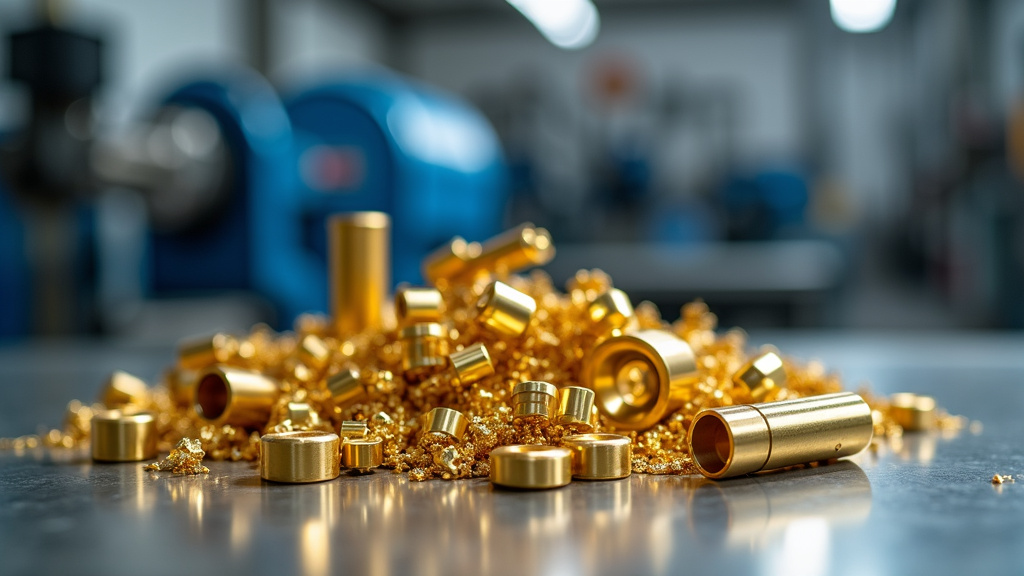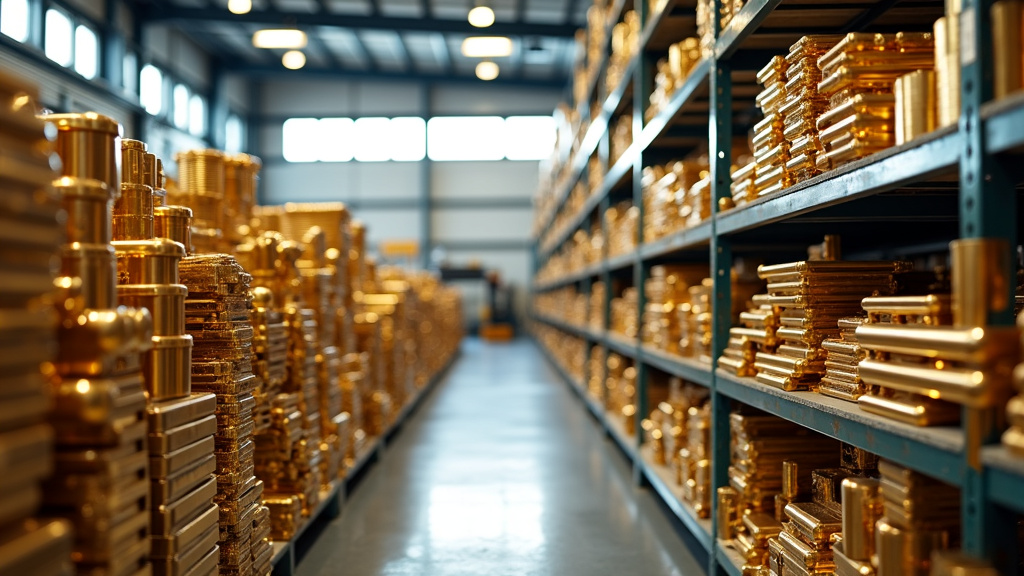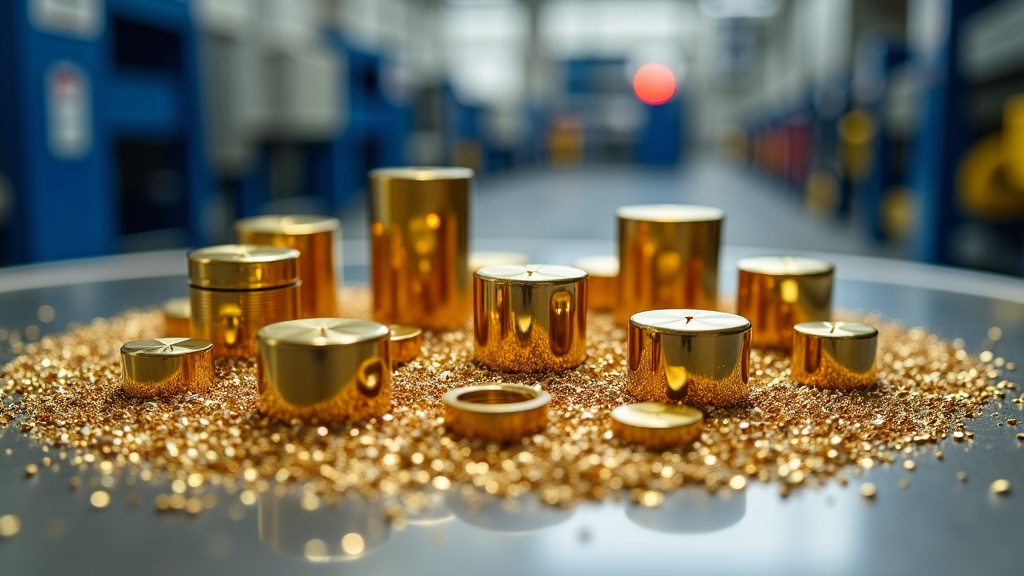5901 Botham Jean Blvd, Dallas, TX 75215
Brass Recycling: A Sustainable Approach
March 21, 2025Did you know that brass recycling can save up to 90% of the energy required to produce new brass from raw materials? This significant statistic highlights the impact of brass recycling on sustainability and resource conservation.
As an alloy mainly composed of copper and zinc, brass is integral to our daily lives, from plumbing fixtures to musical instruments. However, its widespread use comes with the responsibility of efficiently managing brass materials once they reach the end of their lifecycle.
Brass recycling is at the forefront of sustainable metal management, offering a solution to conserve natural resources and reduce environmental impact. This process involves collecting discarded brass items, sorting them based on composition, and repurposing them into new products. By doing so, we not only divert valuable materials from landfills but also significantly reduce the demand for virgin copper and zinc extraction, which often leads to habitat destruction and water pollution.
Economic Benefits of Brass Recycling

Brass recycling isn’t just an environmental win—it’s an economic powerhouse. This often-overlooked industry significantly contributes to job creation, cost reduction, and market stabilization. Let’s explore the financial impact of giving brass a second life.
First: job creation. The brass recycling sector is a robust employment engine. According to a 2020 EPA report, recycling and reuse activities in the U.S. accounted for 681,000 jobs and $37.8 billion in wages. While this covers all recycling, brass plays a significant role. The metal recycling industry, including brass, is labor-intensive, creating a variety of skilled positions across collection, sorting, and processing.
The benefits extend beyond employment. Brass recycling significantly reduces production costs for manufacturers. Using recycled brass can save up to 90% of the energy needed for primary production, which directly translates to lower expenses for businesses relying on brass components.
Reducing Raw Material Dependence
Recycling brass also decreases reliance on imported raw materials. For example, the European Union produces only about 3% of the primary raw materials required to meet its metal demand. By fostering a robust brass recycling industry, countries can reduce dependence on volatile international markets and enhance economic resilience.
Moreover, brass recycling plays a crucial role in stabilizing metal prices. By providing a steady domestic material source, recycling helps buffer against the price fluctuations often seen in primary metal markets. This stability is invaluable for industries heavily reliant on brass, such as plumbing and electronics manufacturing.
A Case Study in Economic Impact
Consider a hypothetical small city that implemented an aggressive brass recycling program. Within two years, they experienced:
- The creation of 50 new jobs at a local recycling facility
- A 15% reduction in production costs for a brass fitting manufacturer, enabling expansion
- A 20% decrease in the city’s raw material import costs
- More stable pricing for local plumbing and construction businesses
While this example is fictional, it reflects real-world impacts seen in communities prioritizing metal recycling. The economic ripple effects of brass recycling extend far beyond the recycling facility itself.
Ultimately, brass recycling isn’t just about being green—it’s a smart economic strategy. By creating jobs, reducing costs, stabilizing markets, and decreasing import reliance, this industry proves that what’s good for the planet can also be beneficial for our wallets.
How Okon Recycling Can Help with Brass Recycling

When it comes to brass recycling in the Dallas-Fort Worth area, Okon Recycling is a trusted leader. With over a century of experience, this family-owned business has honed its expertise in metal recycling to provide unparalleled services to both businesses and individuals.
Okon’s specialized brass recycling services demonstrate their commitment to sustainability and innovation. Their state-of-the-art facilities use cutting-edge technology for efficient and environmentally-friendly processing of brass materials.
What sets Okon apart is their deep understanding of the unique challenges and opportunities in brass recycling. Brass, an alloy of copper and zinc, requires specific handling and processing techniques to maximize its recyclability and value.
Tailored Solutions for Diverse Needs
Okon Recycling recognizes that recycling needs vary. Whether you are a large manufacturing facility with industrial brass scrap or an individual with old brass fixtures, Okon’s expert team can devise a tailored solution to meet your specific requirements.
For businesses, Okon offers comprehensive metal recycling services that integrate seamlessly with existing operations. This might include providing on-site collection containers, scheduled pick-ups, or on-site processing for large volumes of brass scrap.
Individuals looking to recycle smaller quantities of brass can use Okon’s public recycling center, where competitive pricing and a user-friendly process make recycling easy and rewarding.
Environmental Benefits of Brass Recycling with Okon
Recycling brass through Okon Recycling offers significant environmental benefits. Brass is infinitely recyclable without quality loss, making it ideal for circular economy practices.
By partnering with Okon, you contribute to conserving natural resources. Recycling brass reduces the need for mining new copper and zinc, which can have substantial environmental impacts.
Moreover, the energy required to recycle brass is considerably less than that needed to produce new brass from raw materials. This energy savings translates to reduced carbon emissions, aligning with global efforts to combat climate change.
Economic Advantages for the DFW Community
Okon Recycling’s brass recycling services benefit both the environment and the local economy. As a Dallas-based company, Okon creates jobs and stimulates economic activity within the DFW area.
Businesses that recycle their brass scrap through Okon can often recover value from materials that might otherwise be discarded. This can provide a new revenue stream or offset production costs, enhancing profitability.
For individuals, Okon’s competitive pricing for brass scrap offers an opportunity to earn money while decluttering and contributing to a more sustainable future.
Commitment to Quality and Compliance
With over 100 years in the industry, Okon Recycling has built a reputation for reliability and integrity. Their brass recycling processes adhere to strict quality control measures and comply with all relevant environmental regulations.
Okon’s team of experts stays updated on the latest developments in recycling technology and best practices. This ensures that their clients receive the most efficient, effective, and environmentally sound brass recycling services available in the DFW area.
By choosing Okon Recycling for your brass recycling needs, you are not just disposing of metal – you are partnering with a company that values sustainability, supports the local economy, and is committed to providing top-notch service tailored to your unique requirements.
The Future of Brass Recycling

The brass recycling industry is on the brink of a major transformation, driven by increasing focus on sustainability and circular economy principles. Innovative technologies are enhancing the efficiency and scope of recycling practices.
A key development is the use of artificial intelligence and machine learning in recycling processes. These technologies are improving sorting and processing capabilities, enabling precise identification and separation of brass from mixed waste streams. This accuracy, previously unattainable with traditional methods, opens new possibilities for recovering brass from complex products and waste materials.
Advanced chemical recycling techniques are also emerging. These methods break down brass alloys into their constituent elements, producing high-purity recycled metals that meet stringent industry standards. This advancement could significantly expand the market for recycled brass, boosting demand and enhancing the economic viability of recycling operations.
With growing awareness of environmental issues, consumers and businesses are increasingly prioritizing sustainable practices. This shift is influencing the supply chain, prompting manufacturers to use more recycled brass in their products and fostering innovation in recycling technologies.
The brass recycling industry is set for substantial growth and innovation. By adopting these technological advancements and sustainability trends, we can move towards a circular economy where brass remains a valuable resource long after its initial use. To capitalize on these opportunities and contribute to a sustainable future, consider partnering with experienced recyclers like Okon Recycling. Their expertise and commitment to innovation can ensure your brass recycling efforts have a lasting positive impact.
Contact Okon Recycling at 214-717-4083 to learn how you can be part of this exciting future in brass recycling.
